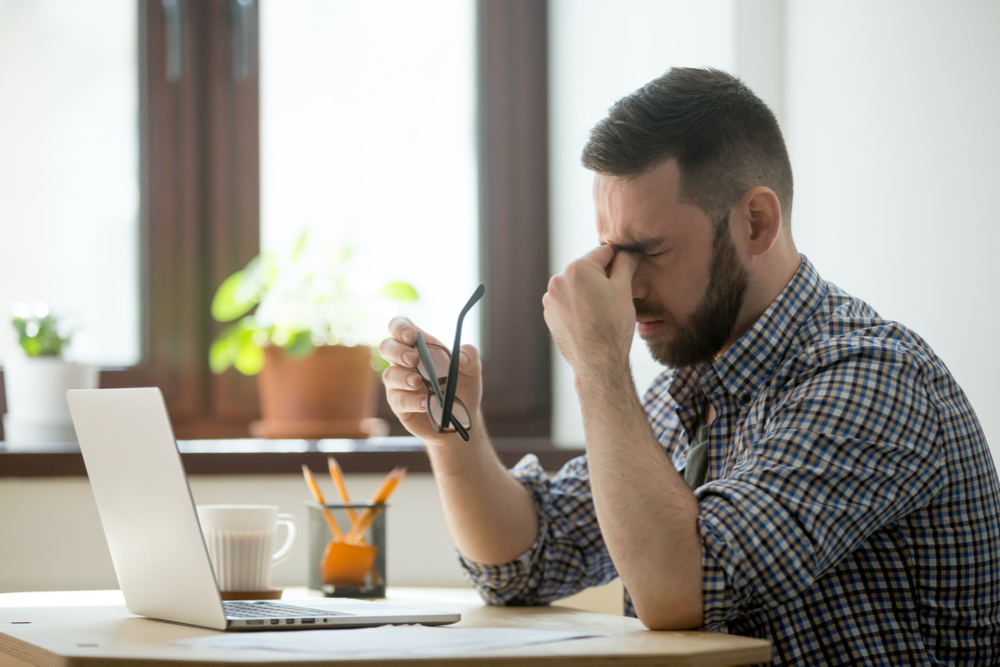- Fast results
- 4,000+ locations
- 4.8 star rating
Need Help? (888) GET LABS



Whether it’s the pressure at work, conflicts in your personal life, or your favorite show on Netflix getting canceled, stress triggers are everywhere. Fortunately, we have plenty of options to deal with them depending on which way suits you best.
However, most people tend to overlook that even if a stress-coping mechanism seems to work quickly, it could have hidden damages that might surface in the long term.
Examples of these unhealthy ways to cope with stress include eating, oversleeping, isolation, too much screen time, and too much dependence on OTC medicine.
Learn more about these unhealthy stress responses and the alternative ways you can go instead to keep your mental and physical health at an optimum level.
One of the unhealthy ways of dealing with stress is comfort eating. Stress is associated with changes in your eating behavior. It has been reported that eating palatable foods can release amounts of mood-enhancing opiates.
Additionally, eating sweets and high-calorie foods such as ice cream, chocolate, or cookies is linked to releasing opiates and serotonin, enhancing mood. Moreover, eating fatty foods can relieve negative emotions in the gut.
Consequently, frequent high intake of sweet, high-calorie fatty foods can lead to emotional eating. It is when you can’t stop eating even when you are not hungry just to alleviate the stress. As a result, you’ll be sacrificing your health and making yourself at risk of diabetes, obesity, and heart disease.
Comfort eating can be done right by leaning more towards healthier foods. For instance, healthy comfort food such as a bowl of warm oatmeal boosts the serotonin level that calms the brain. Likewise, fruits such as oranges are a good source of vitamin C that can curb levels of stress hormones such as cortisol and, at the same time, strengthen the immune system.

Sometimes, it is good to be alone to meditate, journal, pray or just be. However, people who are extremely stressed out tend to isolate themselves in an unhealthy manner, leading to social isolation and loneliness.
According to the Cigna survey, loneliness in American adults has reached epidemic levels in all age groups. While self-isolation to regroup and compose yourself can be healthy, it opens doors to mental health problems when frequently done and for a more extended period.
If you feel like isolating yourself, the healthier response is to connect with your family and friends. Find someone you can trust who can listen and support you when you are at your lowest.
When you are physically and mentally exhausted, sleeping becomes a default reaction. Although getting ample rest allows you to eliminate the negatives of stress, doing it beyond the average time.
Oversleeping does not simply take your productive hours, but it can also be a cry for help, especially when dealing with mental health issues. For example, according to a sleep psychologist, 15% of people who have atypical depression oversleep.
Atypical depression is a condition in which the mood response of the person changes and feels positive emotion, but temporary. Ultimately, oversleeping and lack of physical activity can cause diabetes, hypertension, and heart diseases.
A much healthier stress response is to engage in physical activities instead of oversleeping. When you exercise, do sports, and do other active hobbies, your nervous system releases endorphins or “feel-good” chemicals to cope with pain and stress.
Furthermore, according to ADAA, scientists have found that regular exercise such as aerobic exercise decreases overall tension levels, stabilizes and elevates mood, and improves sleep and confidence.
According to comparitech, data from Data Report shows that the average American spends 7 hours and 4 minutes looking at a screen daily. Also, America is one of the biggest screen-time consumers in the world.
While many people often turn to their smartphones and other gadgets to cope with stress, this habit can quickly become an addiction.
And like any other type of addiction, increased screen time for games, social media scrolling, and more produces bursts of happy hormones called dopamine. This chemical is released when the brain anticipates a reward after doing or consuming something.
However, when your brain releases too much dopamine too often, you become dependent on the trigger. As a result, one hour spent on screen time becomes 2 hours and more as you make it a habit. But it is an unhealthy way of dealing with stress as it limits essential parts of a healthy lifestyle such as getting active, eating healthy, and more.
Moreover, since it leads to sedentary life, you become more susceptible to diabetes, heart diseases, hypertension, or even depression and anxiety.

To break this unhealthy way of coping with stress, here are some of the healthy activities to do:
According to NCCIH, practicing meditation may reduce high blood pressure, specific psychological disorders, anxiety, depression, insomnia, and pain.
For instance, mindfulness meditation helps control the pain and does not need to use the brain’s naturally produced opiates to alleviate the pain. Thus, it is a much safer and transforming practice to deal with unhealthy stress.
Setting a goal or doing a specific hobby can help you feel less stressed. For example, if you like hiking and challenge yourself to climb the summit, this will give you a sense of accomplishment and release happy hormones.
Not only that, interacting and creating connections with others who have the same interests as you is one of the effective ways to feel a sense of community and belongingness.
In times of difficulties such as pain, stress, worry, and anxiety, many people turn to substances or pain relievers to help them cope with stress.
According to Pharmaceutical Journal, the abuse of OTC and prescription medication is growing worldwide, especially during the COVID-19 pandemic. Although OTC or prescription drugs alleviate the production of stress hormones like cortisol in the body, too much reliance on them is detrimental to your well-being. For one, you become at risk of addiction.
It is crucial to never self-diagnose and self-medicate, especially when the condition is noticeably not normal. Thus, see your doctor and get professional advice.
You can have your cortisol level checked. Cortisol is known as the primary stress hormone produced by the adrenal glands released during stressful situations. Too much cortisol in the body causes high blood pressure and sugar, obesity, fragile skin, muscle weakness, and osteoporosis.
If you are medically diagnosed with a mental health condition, medications become imperative. However, you can talk to your doctor about other natural interventions such as drinking herbal teas, undergoing therapies, etc.
Living a highly stressful life is never healthy. It’s also bad news when you cope up with stress in ways that may seem effective but slowly aggravates your mental health state – not to mention the problems they pose on your physical health. With that, it’s best to consult your doctor and explore healthier ways to deal with stress.

© Copyright 2025 Personalabs. All Rights Reserved.